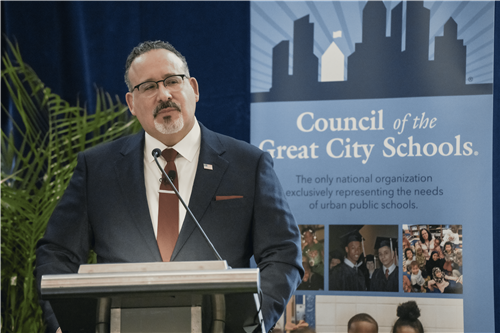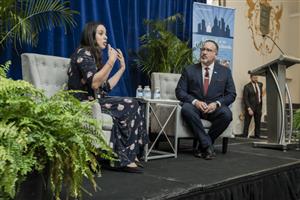- Council of the Great City Schools
- Education Secretary Cardona: School Leaders, Be Changemakers
Urban Educator - April 2023
Page Navigation
- Education Secretary Cardona: School Leaders, Be Changemakers
- Fighting for Student Reading Success
- Journalist Says Urban School Leaders in the Forefront of Change
- Kansas City Names New Superintendent
- How Three Urban School Districts are Investing and Tracking ESSER Funds
- Linguist Lily Wong Fillmore Named Recipient of Dr. Michael Casserly Legacy Award
- Urban Schools Win Green Ribbon Awards
Education Secretary Cardona: School Leaders, Be Changemakers
-
U.S. Education Secretary Miguel Cardona urged educators to seize the moment and focus on key priorities including support for student well-being, school safety, and efforts to hire and retain teachers and other school staff.
‘We’re in a pivotal moment of transformation, one we probably won’t see again in our lifetime,” Cardona said in remarks at the March Legislative/Policy Conference of the Council of the Great City Schools. (Watch his entire speech) “Over the last two years, despite unique challenges, leaders like you have challenged the status quo of complacency and neglect in education. You’ve invested in programs that truly raise the bar.”
Cardona credited the American Rescue Plan (ARP), which has a spending deadline of Sept. 30, 2024. He noted ARP funds were aimed at the safe and speedy reopening of schools in the wake of the COVID-19 pandemic – with a focus on academic recovery, attention to mental health issues, and fixing such issues as faulty ventilation in schools. But, he said, ARP was not meant to “address decades of underinvestment in education.”

The question, he said, is “how do we make sure we can sustain what we started?” The answer in large measure, he said, lay in effective advocacy. “We need to paint the picture of how ARP helped our kids.”
There are successes to point to, Cardona noted: intensive reading instruction in St. Paul, new CTE pathway programs in Wichita, new internships and externships as well as partnerships with local workforce, college programs, and dual-credit pathways.
“You have been heroes,” the speaker told the audience. But, he said, “transformational change will rely on systems, not superheroes.… Focus on systems, build mechanisms, nurture relationships and partnerships that can outlast you.… You are the changemakers and now is the time.”
Cardona also addressed an issue of great concern to educators—a mental-health crisis among students exacerbated by the pandemic and increased violence in their communities. Cardona noted with alarm research suggesting one in three high school girls had considered suicide in the last three years.
“This administration will continue to fight not only for funding to make sure your schools are safer but also to [broaden efforts] to prevent the community violence that trickles into your doors,” the secretary said. “… Our schools are the psychological emergency rooms of society – you are battling shootings on your school property and violence in your community.”
In a Q&A session, Kelly Gonez, chair of the Council and board member of the Los Angeles Unified School District, asked whether the administration had shifted priorities, as reflected in its FY 2024 proposed budget.
“Definitely not,” Cardona responded, calling attention to funding streams “for things that didn’t exist before.… We really are pushing to try to reimagine schools.”
Examples cited by the secretary include “grow your own” efforts to attract teachers -- including so-called registered apprenticeships to expand the teacher pipeline, pay for student teachers, and para-educator programs.

He also praised the trend toward full-service community schools, such as the initiative in Los Angeles, which partners with the local mental health department and other agencies to offer a range of social services for students and families.
Gonez told Cardona that districts are “facing a persistent mental health crisis with our students.... So many are dealing with depression, anxiety, stress, trauma.” With districts soon losing Elementary and Secondary School Emergency Relief (ESSER) funds, she asked what federal aid might look like.
The secretary called attention to grants available via the $2 billion Bipartisan Safer Communities Act (passed in the wake of the mass shooting at Robb Elementary in Uvalde, Texas) that can help districts expand mental health supports. There’s also an effort to bring Medicaid resources to the aid of schools to benefit students’ mental and physical well-being, he said.
Cardona lauded an initiative in Kent, Michigan, high schools where a period for mental and social-emotional well-being is built into every student’s class.
“You have to focus on academics, but if our children are not well they are not going to learn as well,” he said.
Gonez told Cardona that increased community violence is “continuing to affect instruction, attendance, and morale.” What’s needed, she said, is “assistance from city, state, and federal partners. We can’t do it alone.”
Cardona agreed, calling for an “intentional partnership and collaboration” with mayors, chiefs of police, community leaders and elders in the community coming together to problem-solve.
“It cannot be the superintendent alone,” he said.
Cardona Discusses Mental Health
Media Contact:
Contact Name
Contact@email.com
(000) 000-0000
Contact Name
Contact@email.com
(000) 000-0000
Contact Name
Contact@email.com
(000) 000-0000
Media Contact:
Contact Name
Contact@email.com
(000) 000-0000
Contact Name
Contact@email.com
(000) 000-0000
Contact Name
Contact@email.com
(000) 000-0000


